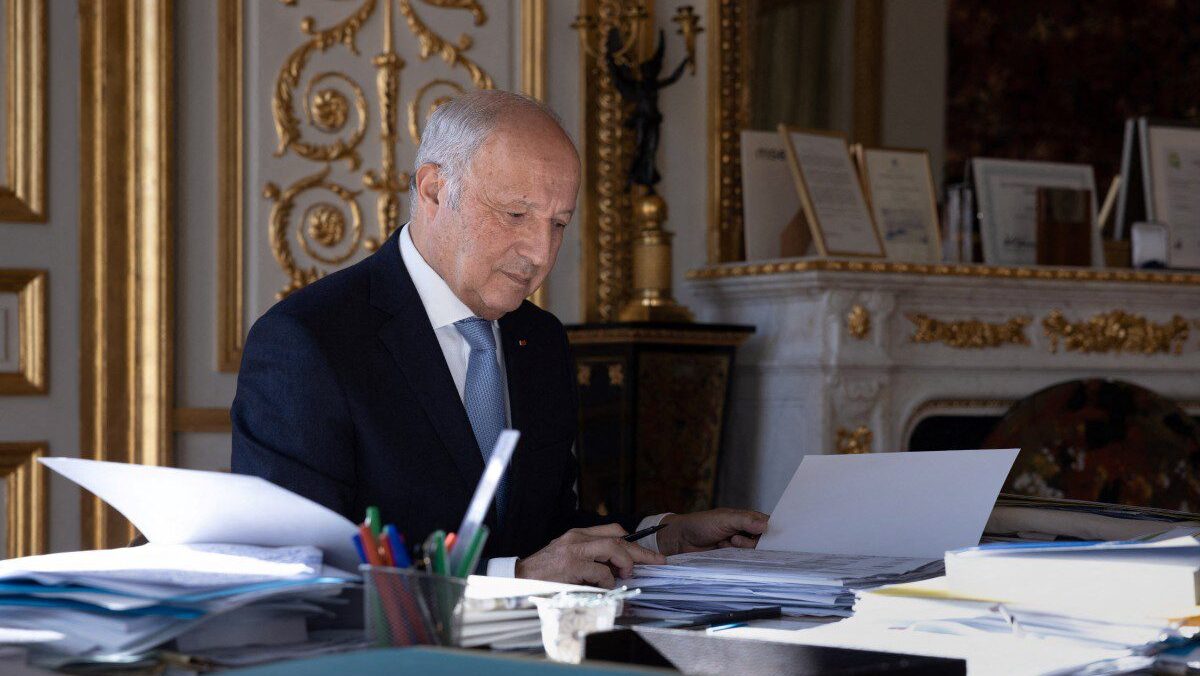
President of the French Constitutional Council Laurent Fabius
Photo: by JOEL SAGET / AFP
At the request of President Macron, France’s Constitutional Council analysed the 2023 immigration law passed before Christmas and rejected almost all of the provisions designed to tighten controls on migratory flows. The right-wing opposition is calling it a political scandal.
After months of stormy debate, Macron’s immigration law was finally passed on December 19th, in a form that had been substantially amended from the initial version. Pressure from the Right, both in the Assembly and the Senate, had enabled a number of provisions to be accepted, aimed at controlling immigration more effectively.
But as soon as the law was passed, frightened by the concessions made to the Right and faced with pressure from the Left, the government gave a series of signals to explain that the law would certainly not be applied as it stood. At the request of the President of the Republic, the Constitutional Council—the supreme legal body responsible for verifying the conformity of laws passed with the Constitution—was called upon in the days following the vote on the law, in the hope that the strongest measures would be overturned.
The opinion issued by the Constitutional Council on Thursday, January 25th exceeded all (worst) expectations. The Immigration Act, although in many respects in line with the wishes of a majority of French people, has been literally gutted. The institution headed by former Socialist Prime Minister Laurent Fabius has scrapped most of the articles designed to reinstate a minimum of firmness in controlling migratory flows. Overall, some 40% of its content is now invalidated.
Among the most emblematic measures—the articles on restricting family reunification, controlling the residence of foreign students, the conditions for granting social benefits and the restrictions on obtaining nationality—have been blocked. These measures were refuted on the grounds of form, by being described as ‘legislative riders’ (cavaliers législatifs), i.e., unrelated to the initial purpose of the law—a political and very restrictive interpretation of what constitutes a legislative rider, which was clearly used here for ideological reasons.
Moreover, three provisions were deemed unconstitutional, in particular the vote on migration quotas and the taking of fingerprints and photos of illegal residents.
In the hours following publication of the Constitutional Council’s opinion, leading right-wing politicians expressed their shock and dismay. Bruno Retailleau, chairman of the Les Républicains group in the Senate, who had helped to make the law much tougher, denounced the “bad faith and legal amateurism” of President Laurent Fabius, head of the council, explaining that the reasons given for the rejection of certain parts of the law were clearly biased and politically oriented to get rid of an embarrassing law. “This is an institutional hostage-taking and a political sham that will have serious consequences for our democratic life,” declared Retailleau on X.
More fundamentally, many on the Right are questioning the very possibility of reforming immigration in France, if the slightest attempt to restore order provokes such institutional resistance. On Friday, lawyer Pierre Gentillet denounced on Sud Radio an attack on the sovereignty of Parliament, designed to restrict legislative power beyond its remit. He sees this institution as “an obstacle to any serious migration policy,” should a national right-wing party come to power and want to legislate to effectively control immigrant arrivals on French soil.
Laurent Wauquiez, former president of the Les Républicains party and potential presidential candidate in 2027, also denounced a “comedy of impotence:”
The Constitutional Council’s decision deprives our country of the opportunity to regain control over immigration on the very day we learn that we are breaking records for the number of residence permits and asylum applications.
The French elect members of parliament who vote for a law that will not be enforced. It’s called the comedy of impotence.
La décision du Conseil constitutionnel prive notre pays de la possibilité de reprendre le contrôle sur l’immigration le jour même où l’on apprend que l’on bat des records en matière de nombre de titres de séjour et de demandes d’asile.
— Laurent Wauquiez (@laurentwauquiez) January 26, 2024
Les Français élisent des parlementaires…
Both Les Républicains and Rassemblement National took the opportunity to reiterate their—identical—proposal for a referendum on immigration, which they consider to be the only solution, to ensure that the wishes of the French people are listened to and respected on the matter. They also want to push forward a reform of the Constitutional Council, accused of now being a political weapon in the hands of the rulers.
Éric Zemmour, for his part, accused the government, the LR party and the Rassemblement National of being guilty of unduly rejoicing at the passing of a law that will ultimately not be applied. “What remains of this law? Only one thing: the regularisation of 10,000 more illegal immigrants who will become 50,000 more foreigners through family reunification,” he denounced on RTL.
Le soir du vote de la #LoiImmigration, Monsieur Darmanin et les dirigeants de LR et du RN se réjouissaient du vote de cette loi, allant jusqu'à parler de « victoire idéologique ».
— Eric Zemmour (@ZemmourEric) January 26, 2024
Mais que reste-t-il de cette loi ?
Une seule chose : la régularisation de 10 000 clandestins de… pic.twitter.com/SPRZxUQ6D4
Noting the resounding failure of the reform, he also reiterated the need for a referendum on immigration. While some of the nascent divisions on the right may damage the struggle for border control, the undemocratic interventions of the Constitutional Council could prove far worse.
